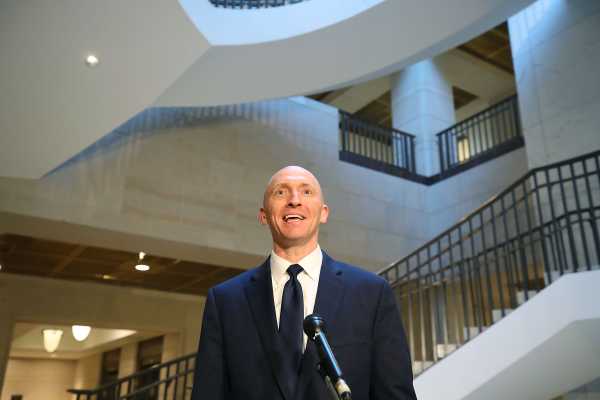
House Republicans have claimed that the “Nunes memo” will reveal “jaw-dropping,” “shocking,” and “sickening” conduct from law enforcement officials in connection with their investigation of the Trump campaign’s ties to Russia — conduct that could even be “worse than Watergate.”
So you may be surprised to hear that the memo, which isn’t yet public, is reportedly mostly, and perhaps even entirely, about … Carter Page.
Yes, that Carter Page. The rather eccentric former Trump campaign adviser, infamous for his extremely pro-Russia views and strange media appearances, has unexpectedly turned out to be the centerpiece of the GOP’s effort to discredit the Russia investigation.
Federal government investigators grew suspicious of Page’s Russian contacts and a trip he took to Moscow during the campaign, so they reportedly wiretapped him in the fall of 2016. They continued this surveillance throughout early 2017. However, so far, Page has not been accused of or charged with anything in special counsel Robert Mueller’s probe.
Now Republicans are angry because the Justice Department’s request for permission to surveil Page partly relied on information from the infamous Steele dossier. That’s the document filled with lurid and scandalous allegations about Trump and his advisers’ ties to Russia that all involved, including Page, have heatedly denied. It’s a problem, the GOP argues, because the dossier project was ultimately funded by Hillary Clinton’s campaign lawyer — meaning that Page was being surveilled in part because of a campaign’s opposition research (which, it should be noted, hasn’t been corroborated and could be entirely false).
Yet law enforcement officials and Democrats who’ve seen the underlying intelligence emphasize that the dossier allegations were only part of the justification for the Page surveillance. The FBI, they say, had good reason to suspect Page beyond the dossier. (Indeed, Page drew investigative scrutiny for his contacts with Russian intelligence in 2013, long before the Trump campaign was a glimmer in anyone’s eye.)
All the while, the man at the center of this firestorm remains an enigma. Again, keep in mind that he hasn’t been charged with anything. For all we know, he could be an ordinary citizen who genuinely thinks the Russian government is great, has a lot of Russian friends and contacts, happened to get in way over his head, and truly was unjustly smeared in the Steele dossier. So let’s dive deeper into the mystery of Carter Page.
1) Who on earth is “Carter Page, PhD”?
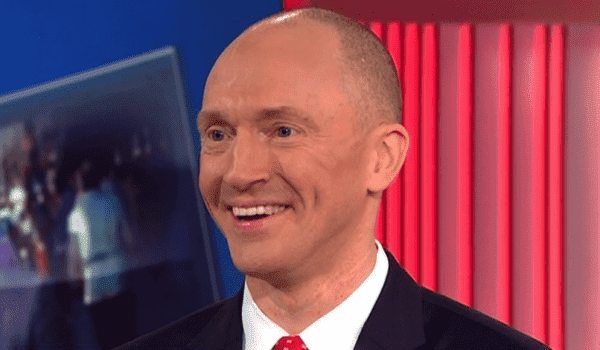

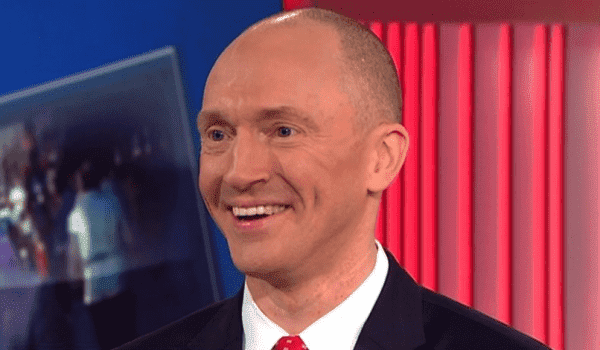
That is the question much of the Washington foreign policy community asked in unison on March 21, 2016. (Well, some probably substituted profanity.)
On that date, presidential candidate Donald Trump sat down with the Washington Post’s editorial board and read out five names of people he said were serving on his foreign policy team. The list included George Papadopoulos, who has since pleaded guilty to making false statements to the FBI about his contacts with Russians — “excellent guy,” Trump said.
Trump also read the name “Carter Page, PhD” — and offered no further elaboration on him.
Within days, though, a few things about Page became clear from a profile by Bloomberg’s Zachary Mider. Page had a whole lot of experience doing business in Russia. He had far more positive views of Putin’s regime than most Americans. And he wasn’t a fan of the US’s sanctions on Russia.
After growing up in New York and spending a few years in the Navy in the 1990s, Page completed a few graduate degrees in international relations and business. Then for most of the 2000s, he worked at the investment banking firm Merrill Lynch, focusing on Russia and Eastern Europe.
His work led him to move to Moscow from 2004 to 2007, and it entailed advising Gazprom, the majority Russian state–owned oil firm, on deals. Soon afterward, he moved back to the US, left Merrill, and went into business for himself, advising investors on Russia-related projects.
Though all this, Page didn’t have a particularly high public profile — until, out of nowhere, Trump dropped his name. Mider quoted a former Merrill executive who’d worked with Page in Russia professing shock at his high-profile new gig. “I could not imagine Carter as an adviser on foreign policy,” the former executive, Sergey Aleksashenko, said. “It’s really surprising.”
2) So why was this rando on Donald Trump’s foreign policy team?
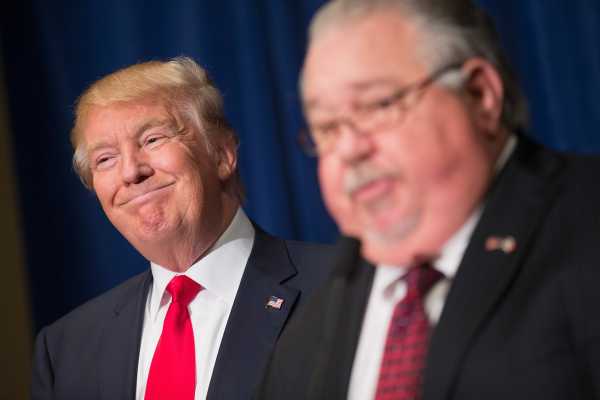

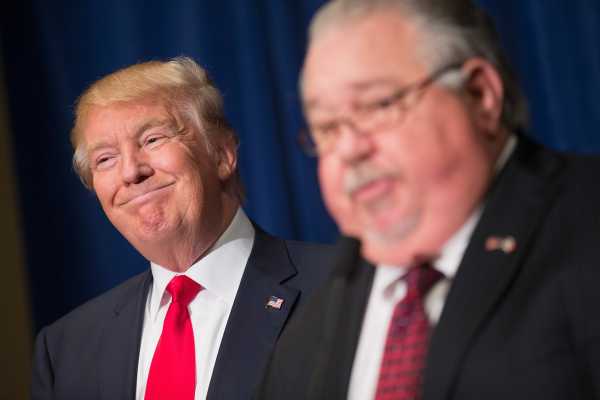
If we think hard enough, we can remember a time before Trump was president of the United States and the undisputed commander of the Republican Party. Back then, he was a disreputable outsider whose campaign faced fierce opposition from the GOP establishment and policy elites and who was considered highly likely to lose the general election.
After Trump’s disorganized and not particularly professional campaign managed to win most of the first GOP primaries, he faced increasing pressure to demonstrate that he was a plausible major-party presidential nominee. His aides decided that part of that task entailed putting together something they could call a “foreign policy team.” The task fell to Sam Clovis, a conservative talk radio host and evangelical activist from Iowa who had distinguished himself by joining the Trump campaign relatively early.
Carter Page didn’t wait for Clovis to find him. According to his later testimony, Page reached out to New York’s Republican Party chair, Ed Cox, in late December 2015, asking to be put in touch with Trump’s team. Cox put Page in contact with then-campaign manager Corey Lewandowski, who sent him over to Clovis, who is said to have put him on Trump’s list of advisers.
The Trump team claims that the main reason they took Page on was that they were taking “anyone … with a pulse,” as a campaign official put it to the Washington Post last year. Indeed, Clovis’s task surely was complicated by the fact that few in the “respectable” GOP foreign policy community were willing to sign on with Trump at that point.
But by one account, Clovis had something else on his mind too. Papadopoulos was added to the same team as Page, and according to a plea agreement he signed last year, Clovis told him early on “that a principal foreign policy focus of the [Trump] campaign was an improved US relationship with Russia.” With that in mind, Page would seem a perfect fit, considering his job history and policy views.
3) What did Carter Page actually do when he was a Trump adviser?
To hear some in Trump’s orbit tell it, he did nothing whatsoever. “Mr. Page is not an advisor and has made no contribution to the campaign,” campaign spokesperson Jason Miller said in September 2016. “He’s never been part of our campaign. Period.”
Indeed, Page testified that he’s never met or even spoken to Trump himself, and that he missed out on the one meeting the Trump foreign policy team had with the candidate because, he said, he had a conflict that day.
However, emails and documents made public in connection with Page’s congressional testimony do show that he was in regular contact with several campaign foreign policy advisers in the spring and summer of 2016 — though it’s not entirely clear what, exactly, he was doing.
On May 16, 2016, Page sent a curious email to two of his fellow foreign policy advisers, J.D. Gordon and Walid Phares. Page wrote (emphasis added):
“The principal” here is Trump, and “this honor” Page wants Trump to “take my place” in, he admitted in congressional testimony, is … a trip to Russia.
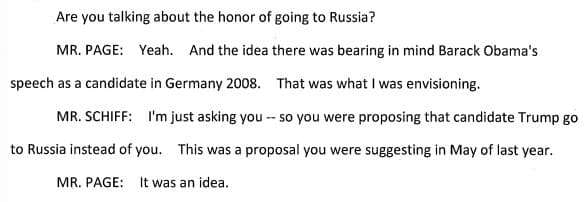

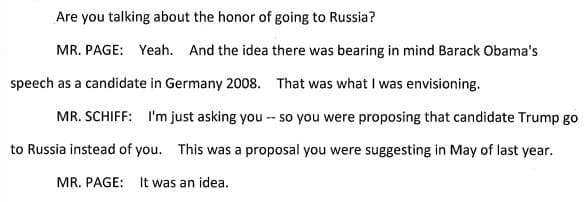
So Page has admitted that he emailed Trump advisers in guarded, roundabout language about an upcoming trip to Russia that was part of a “strategy” previously discussed with others on the campaign.
Trump didn’t end up going to Russia that year — but Page did, for a five-day trip in July 2016. This raised eyebrows even at the time, since Page gave a public speech in which he criticized US policy as too antagonistic toward the Kremlin. Yet Page and Trump’s team said, then and afterward, that Page took this trip purely as a private citizen and not at all on behalf of the campaign.
After Page returned, he started to keep tabs on preparations for the Republican convention. And when Trump’s team helped block a delegate’s proposed amendment calling for the US to arm Ukraine, Page was thrilled. “As for the Ukraine amendment, excellent work,” he wrote in an email to several campaign foreign policy officials.
But rumors soon swirled about what Page might have been up to during his Moscow trip. After a briefing in August, Senate Minority Leader Harry Reid wrote a letter to the FBI saying “questions have been raised” about whether Page met with “high-ranking sanctioned individuals” during his trip.
Finally, in September, Michael Isikoff of Yahoo News reported that the government was investigating Page’s ties to the Kremlin — a revelation that led the Trump campaign to harshly disassociate themselves from Page. (In Page’s own telling, he chose to take a leave of absence. He denied doing anything wrong.)
After Trump had won the election, Page never appeared to rejoin his team. He took another trip to Russia in December 2016, during the transition, but testified that this trip was also undertaken entirely on his own.
4) So what happened during Carter Page’s July 2016 trip to Russia?
There are basically two possibilities.
The first is that, as Page says, he traveled to Russia on his own initiative, meeting with various business and personal contacts, and that nothing all that significant took place.
The second is that he’s hiding something.
Rumors of the latter soon reached the ears of Christopher Steele, the former British spy researching Trump’s Russia ties. On July 19, 2016, Steele filed a report for what become known as his “dossier” focused on Page’s Russia trip. Citing Russian sources, he wrote:
- That Page had met with Igor Sechin, the CEO of Rosneft, the majority Russian government-owned oil company, and discussed lifting US sanctions
- That Page had also met with Igor Diveykin, a Russian intelligence official, and discussed Russian “kompromat” on Clinton (and Trump)
In a later report, dated October 18, 2016, Steele made an even more astonishing claim:
- That when Page allegedly met with Sechin, the oil executive had offered Page and Trump’s associates “the brokerage of up to a 19 per cent (privatized) stake in Rosneft in return” for lifting sanctions, and that Page “expressed interest” and confirmed that Trump would lift sanctions if he won
But in the year and a half since, no one has yet managed to confirm any of the claims in Steele’s dossier about Page’s trip. (My opinion is that they should be viewed with extreme skepticism.)
Page, meanwhile, has furiously denied the claims, saying that he’s never met either Sechin or Diveykin and disparaging what he calls the “dodgy dossier” both in media appearances and under oath.
Still, Page’s story that the trip had nothing to do with Trump’s campaign doesn’t entirely fit with the evidence either.
- George Papadopoulos was also emailing campaign advisers about a potential Trump trip to Russia around the same time. And according to his plea deal, one senior official forwarded his email to another and wrote, “Let’s discuss. We need someone to communicate that DT is not doing these trips. It should be someone low level in the campaign so as not to send any signal.”
- Page sent other Trump aides a memo about his trip, in which he referred to himself as “Campaign Adviser Page.” In it, he described a “private conversation” he had with Deputy Prime Minister Arkady Dvorkovich, who he said “expressed strong support for Mr. Trump.”
- Page also wrote an email to two Trump aides saying he’d received “some incredible insights and outreach […] from a few Russian legislators and senior members of the Presidential administration here.”
- Also, Page admitted that he did meet with a different Rosneft executive — Andrey Baranov, the company’s head of investor relations, with whom he had a preexisting relationship.
When asked about some of this under oath, Page sounded evasive. He claimed his interaction with Dvorkovich lasted “well less than 10 seconds,” and that his reference to “insights and outreach” referred merely to speeches he’d attended and articles he’d read during his trip.
Now, there is a relatively innocent potential explanation here: that Page, in his real-time reporting back to the Trump campaign last year, could have been wildly exaggerating his own connections and what he had achieved in Russia to make himself appear more important and influential. But the documents certainly give reason to suspect there was more to Page’s Russia trip than we know — even if it’s unclear what it might be.
5) Why did US law enforcement officials start looking into Carter Page’s ties to Russia?
Well, it depends which time you’re referring to.
In fact, the FBI interviewed Page because of his contacts with a Russian intelligence operative all the way back in 2013.
The bureau was looking into a suspected Russian spy ring and learned that one of their suspects, Victor Podobnyy, had met with Page in hopes of finding a potential recruit. In fact, Podobnyy was caught on a wiretap discussing Page:
Podobnyy said one more thing about Page on the tap. “I think,” he said, “he is an idiot.”
Page did end up giving some energy business documents to Podobnyy, and the FBI interviewed him about it in June 2013. But they decided Page didn’t know Podobnyy was a spy, and didn’t charge him with anything.
6) Okay, then why did US law enforcement officials start looking into Carter Page’s ties to Russia again during the presidential campaign?
According to the New York Times, the FBI opened an investigation into Trump associates’ ties to Russia at some point in July 2016, after receiving a tip that George Papadopoulos had bragged to an Australian diplomat that he knew Russia had dirt on Hillary Clinton.
Christopher Steele was meanwhile doing his own investigation at the time — and was providing what he found to his own contacts in the FBI (who had worked with him before and viewed him as a reliable source of information).
So it was apparently some combination of 1) the obvious (Page’s trip to Russia and history of Russian contacts); 2) Steele’s information; and 3) other information the government obtained from other sources that led the FBI to zero in on Page.
But it was reportedly on October 19, 2016, that the Justice Department took the particularly dramatic step of asking for permission to surveil Page’s communications. (Note that this was a month after the Trump campaign disassociated itself from Page and said he had nothing to do with it, which would seem to debunk the talking point that this was an excuse for the FBI to spy on the Trump team.)
That application to the Foreign Intelligence Surveillance Court is said to be the central preoccupation of the Nunes memo. The memo reportedly argues that the surveillance application relied on information from Steele’s dossier without proper
Yet all sides also admit that the application didn’t entirely rely on the dossier, and that the FBI had other sources of information as well. Law enforcement officials and Democrats who’ve seen the memo argue that it gives a misleading picture of how strong the application to surveil Page was, by leaving out those other sources for political reasons.
Another angle is that FISA surveillance applications have to be renewed every 90 days. The government is said to have applied for more surveillance on Page at some point in January or February 2017, and then again in late April or May 2017 — with the latter application approved by newly sworn-in Deputy Attorney General Rod Rosenstein. (Rosenstein is special counsel Robert Mueller’s boss and ultimately oversees the investigation that Trump hopes to discredit.)
7) What is up with Carter Page’s media and legal strategy?
Rather than lawyering up and responding with caution to the Russia scandal, as most others potentially implicated in it have, Page was omnipresent discussing the topic in seemingly nonstop media appearances last year — in a way that both baffled and entertained political observers.
Throughout these appearances, Page frequently filibustered, went on tangents, and worked himself into a state of high dudgeon while maintaining that he was completely innocent of any wrongdoing and was being unjustly smeared. He also testified before the House Intelligence Committee last November for more than six hours — without a lawyer.
“The past few months has been one of the greatest pleasures of my life,” he told USA Today last fall. “You don’t fully appreciate the law and a just, functioning legal system until you’ve had your basic civil rights so severely abused based on the lies funded by rich political patrons.”
“I genuinely hope, Carter, that you’re innocent of everything, because you’re doing a lot of talking,” MSNBC’s Chris Hayes told him in October. “It’s either admirably bold or reckless, but I guess we’ll find out.”
8) How important is Carter Page to Robert Mueller’s investigation?
For all we know, he isn’t important to it at all.
The Washington Post reported that in March 2017, FBI agents interviewed Page for a total of about 10 hours over five separate meetings, and asked him about claims made in the Steele dossier.
But there’s no indication that this led anywhere, and it happened before Mueller was appointed to lead the investigation in May.
Mueller has held his cards remarkably close to the vest all along. But he’s indicted two former Trump aides already — Paul Manafort and Rick Gates. And he’s gotten two others — George Papadopoulos and Michael Flynn — to become cooperating witnesses as part of plea deals. None of the charges that have been brought appear to relate in any way to Page, or (so far as we know) to information learned from the surveillance of Page.
So it’s entirely possible that investigators eventually concluded Page did nothing wrong and moved on to focus their probe elsewhere. Or not.
9) That was long. Can I see a picture of Carter Page to close it out?
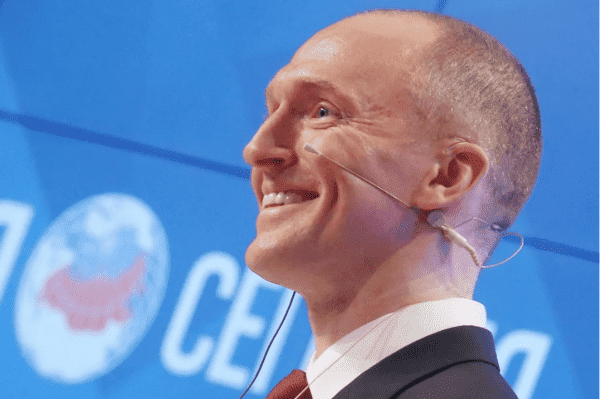

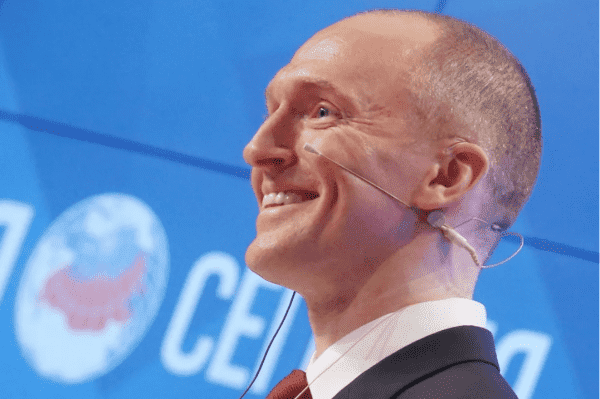
Sure you can.
Sourse: vox.com






